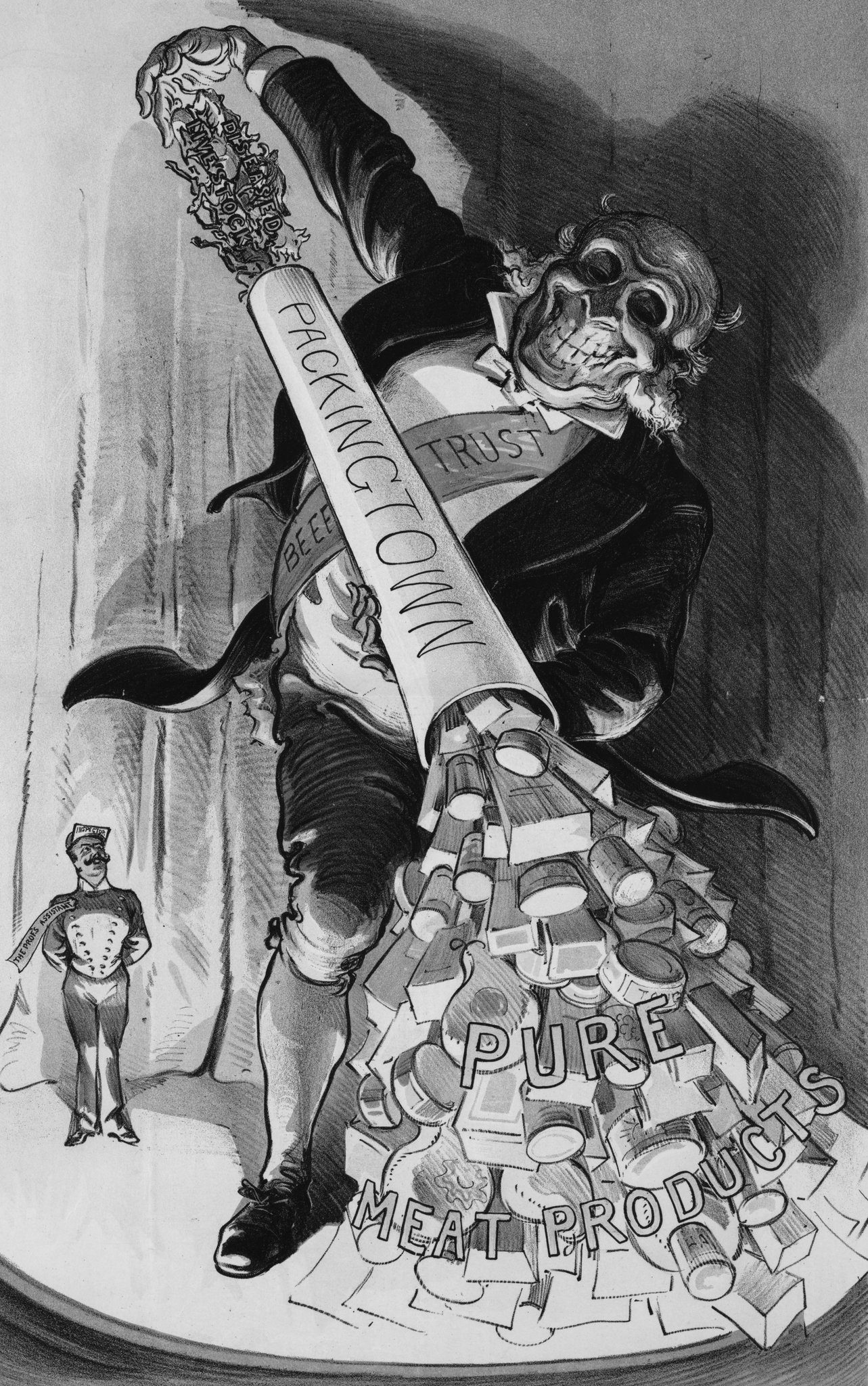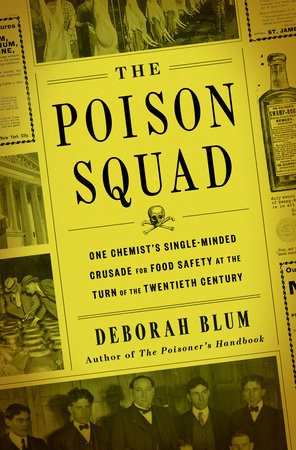New York Times: The Man Who Pioneered Food Safety
by Eric Schlosser | Oct. 16, 2018
THE POISON SQUAD
One Chemist’s Single-Minded Crusade for Food Safety at the Turn of the Twentieth Century
By Deborah Blum
330 pp. Penguin Press. $28.
In April 1906, a Republican president of the United States met privately with a notorious socialist at the White House. The president was Theodore Roosevelt; the socialist was Upton Sinclair; and the two set aside their political differences to discuss an issue of great mutual concern: food safety.
A few months earlier, Sinclair’s novel “The Jungle” had created public outrage about the sanitary conditions at America’s slaughterhouses. Roosevelt had distrusted the meatpacking industry for years, angered by the putrid meat sold to the Army and served to his troops during the Spanish-American War. In 1906 the United States was the only major industrialized nation without strict laws forbidding the sale of contaminated and adulterated food. In their absence, the free market made it profitable to supply a wide range of unappetizing fare. Ground-up insects were sold as brown sugar. Children’s candy was routinely colored with lead and other heavy metals. Beef hearts and other organ meats were processed, canned and labeled as chicken. Perhaps one-third of the butter for sale wasn’t really butter but rather all sorts of other things — beef tallow, pork fat, the ground-up stomachs of cows and sheep — transformed into a yellowish substance that looked like butter.
Historians have long credited the unlikely alliance of Roosevelt and Sinclair for passage of the Meat Inspection Act and the Pure Food and Drug Act of 1906. In “The Poison Squad,” Deborah Blum makes a convincing case that a now forgotten chemist at the Department of Agriculture, Harvey Washington Wiley, played a more important role — not only in ensuring the passage of those bills but also in changing popular attitudes toward government intervention on behalf of consumers. The origins of today’s food safety laws, drug safety laws, labeling requirements and environmental regulations can be found in the arguments of the Progressive movement at the turn of the last century. As the Trump administration proudly weakens or eliminates those measures, the life work of a 19th-century U.S.D.A. chemist has an unfortunate significance.
Harvey Washington Wiley was born in a log cabin on April 16, 1844, a fitting entrance for an American hero. His father was a farmer and a lay preacher in southern Indiana who sheltered escaped slaves as part of the Underground Railroad. Wiley served briefly in the Civil War, studied medicine in Indiana and chemistry at Harvard, and became the first chemistry professor at Purdue University in 1874.
The deliberate adulteration of food had been a problem for millenniums, inspiring government regulations in ancient Egypt, Sumeria and Rome. By the late 1870s, the Industrial Revolution, applied to food processing, provided a variety of new techniques and ingredients useful for committing fraud — artificial flavors, artificial colorings, chemical preservatives. But simultaneous advances in chemistry also facilitated the detection of such fakery. At the request of the Indiana State Board of Health in 1881, Wiley began to study the authenticity of the honey and maple syrup for sale in that state. According to Blum, he used laboratory instruments like the polariscope to uncover that “a full 90 percent of his syrup samples were fakes … and there were ‘beekeepers’ who had not, of late, been bothering to keep bees.” Wiley’s findings soon appeared in Popular Science magazine, and his career as a public crusader was launched.
After being named the U.S.D.A.’s chief chemist in 1882, Wiley spent the next 30 years at the department campaigning for safe food and proper labeling. He supervised a series of investigative reports that gained much public attention, warning about “pepper” made from sawdust, “cocoa powder” containing iron oxides and tin, “flour” laced with clay and powdered white rocks, “whiskey” that was actually watered-down ethyl alcohol tinted brown with prune juice, “coffee” that featured ingredients like sand, tree bark, ground acorns, charcoal and a black powder composed of charred bone. To test the health impact of various additives, he recruited young men to serve as guinea pigs in “hygienic table trials,” serving them questionable ingredients during meals in the basement of U.S.D.A. headquarters — and then observing what happened. Soon known as the Poison Squad, these idealistic volunteers embraced the motto on a sign in their special dining room: “ONLY THE BRAVE DARE EAT THE FARE.”
By 1902, Wiley had become a national celebrity, and “Song of the Poison Squad” was performed at minstrel shows. The National Food Processors Association and other industry groups were not pleased, to say the least. The adulteration of food had become so brazen that manufacturers openly advertised products like “mineraline,” “fluorine” and Freezine that either substituted for real ingredients or disguised the presence of spoilage. Freezine contained formaldehyde, an ingredient in embalming fluid, that was toxic and commonly mixed with rancid milk. For his efforts on behalf of food safety and integrity, Wiley was described in one trade journal as “the man who is doing all he can to destroy American business.” Misleading articles by nonexistent journalists were circulated to harm his reputation. The newly formed Monsanto Chemical Company became one of his most persistent foes, after U.S.D.A. chemists questioned the safety of saccharine and caffeine, two additives that it manufactured.
Wiley’s honesty, charisma, dedication to science, political acumen and flair for publicity helped him survive attacks by trade groups and adversaries within the U.S.D.A. He formed alliances with women’s organizations, consumer advocates, muckraking journalists and Fannie Farmer, the leading celebrity chef of the era. “The Poison Squad” chronicles years of bureaucratic battles, the cowardice of elected officials, the triumph of food safety bills in 1906 and the legislative compromises that greatly disappointed Wiley. He later found comfort in family life at the age of 66, marrying Anna Kelton, a suffragist 32 years younger than him, and fathering two children. Wiley retired from the U.S.D.A. in 1912 and ended his career as an outspoken columnist for Good Housekeeping.
Blum cares passionately about her subject. Her prose is graceful and her book is full of vivid, unsettling detail. But “The Poison Squad” suffers from a lack of historical context. Wiley’s crusade for pure food was part of a larger Progressive movement challenging monopoly power and government corruption. Blum provides little sense of how Wiley’s reforms fit with Progressive demands for scientific management, domestic purity and the rule of experts. More surprisingly, Blum never addresses the scientific validity of the double-blind experiments that Wiley conducted with his human subjects. Members of the Poison Squad may have experienced “fullness in the head and distress in the stomach” after consuming certain substances. But were Wiley’s tests of additives like saccharine and sodium benzoate — whose health effects still remain controversial — sound science or pseudoscience? We never learn the answer.
More than a century after the heyday of Harvey Washington Wiley, the deceptions continue. A 2012 study by Oceana, an environmental nonprofit, found that one-third of the seafood purchased in the United States had been mislabeled. Tilefish — a species known to contain high levels of mercury — was frequently sold as halibut and red snapper. At sushi restaurants, three-quarters of the fish wasn’t what the menu said it was.
Today there are still remarkably few legal restrictions on the sale of meat contaminated with dangerous pathogens. A large proportion of the poultry for sale at supermarkets is tainted with antibiotic-resistant salmonella. And the U.S.D.A. lacks the authority to demand a recall of that meat. A report published by the American Academy of Pediatrics in July warned that food additives may endanger the health of children. Of the nearly 4,000 food additives evaluated, almost two-thirds have never been tested for their toxicity after being eaten. Only 7 percent have been tested for their effect on reproduction. And only two of the additives have been tested for developmental harms. Nevertheless, Donald Trump has criticized the “inspection overkill” of the “F.D.A. food police.” “The Poison Squad” offers a powerful reminder that truth can defeat lies, that government can protect consumers and that an honest public servant can overcome the greed of private interests.
Eric Schlosser is the author of “Command and Control” and “Fast Food Nation.”

